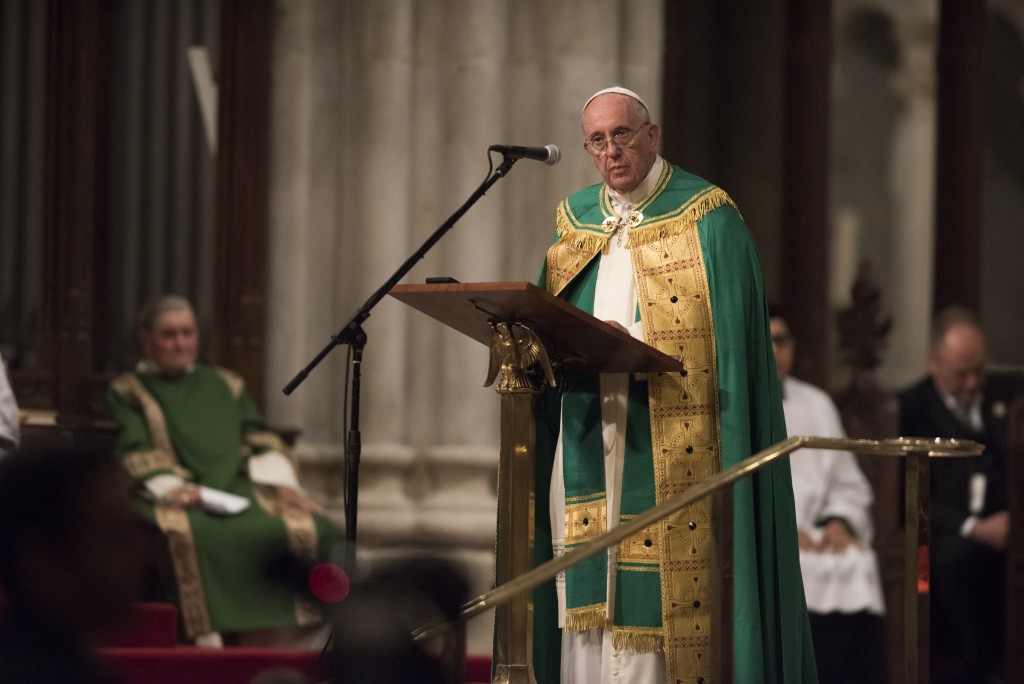 Photo credit: Jeffrey Bruno
Photo credit: Jeffrey Bruno
Pope Francis’s trip to the United States in September centered on his appearance at the World Meeting of Families in Philadelphia. Here is the fourth quote in the series, from the meeting with bishops on September 26:
“Until recently, we lived in a social context where the similarities between the civil institution of marriage and the Christian sacrament were considerable and shared. The two were interrelated and mutually supportive. This is no longer the case.”
Pope Francis acknowledges the rift that has opened up between the civil and religious conception of what marriage is. This rift did not begin on June 26th, 2015, but rather has its roots in the so-called “sexual revolution.”
Think about the essentials of marriage, according to Catholic teaching: unity, indissolubility, and procreation. The dominant American culture and society have rejected these truths systematically for about the last 50 years. Widespread individualism, adultery, “no-fault” divorce, contraception, sterilization, and assisted reproductive technologies have whittled away at the public consciousness of what marriage and procreation is or is meant to be. Now, with the redefinition of marriage, America has continued in this path. And now the Catholic Church is called to proclaim even more courageously the truth about marriage, family and the human person in a hostile climate.
Why does it matter what the culture does, as long as the Church knows what marriage is?
Law and culture are teachers. Mass media and all of the messages that come from radio, TV, and film have an effect on the formation of our minds and consciences. This is not only a conscious process but largely an unconscious one. Messages from the culture become like the air we breathe: not noticed or observed, simply accepted. No matter how strong your individual family “unit” is, it is affected by the world around it. Let’s look at fidelity as a concrete example.
A culture where promises are honored strengthens marriages. Married couples, especially in hard times, benefit greatly from the example of other married couples who made it through similar experiences. The divorce of someone’s parents, even if it happens when he or she is an adult, affects the child’s marriage. Because her parents are divorced, a woman cannot rely on her own mother or father to assure her that, “It will be okay, just take it one day at a time.”
“Dinner with Friends,” a play by Donald Margulies, centers on two married couples with children. One of the marriages breaks up, and this deeply affects the other marriage, even though the other couple stays together. There’s a sense that the couple who broke up did not break faith only with each other, but also with their friends.
The agrarian author, Wendell Berry, speaks of the promise of fidelity in marriage being made not only to one’s own wife, but to every other woman. “The forsaking of all others is a keeping of faith, not just with the chosen one, but with the ones forsaken. The marriage vow unites not just a woman and a man with each other; it unites each of them with the community in a vow of sexual responsibility toward all the others” (“The Body and the Earth”). If Jack promises to be faithful to Jill, not only should Jill be able to be secure in that promise, but Jane, Anne, and Mary should also be secure that Jack will never look at them as a possible partner. One promise means freedom for everyone.
In an age where there are businesses designed to help spouses cheat on their partners, and where many divorces occur because of adultery, everyone is naturally more insecure about trusting the fidelity of married people. As Pope Francis noted in a recent general audience, being true to your word used to be considered a point of honor: “And, speaking of fidelity, there comes to mind what our elderly, what our grandparents tell us about ‘those times when an agreement was made, a shaking of hands was sufficient, because there was fidelity in promises’ (October 21, 2015). Our culture today does not uphold fidelity, and therefore fidelity is harder to practice. This is just one example of what Pope Francis was pointing to in his speech to the bishops in Philadelphia.
Very good, very clear explanation. I am hoping people will be able to marry in the sacrament of marriage without having to establish a civil declaration of marriage at the same time.
Sorry, Bill, but the sacrament does not give spouses property rights. That’s the reality we live in. Civil declaration is what gives the legal protection. No religious has authority there.